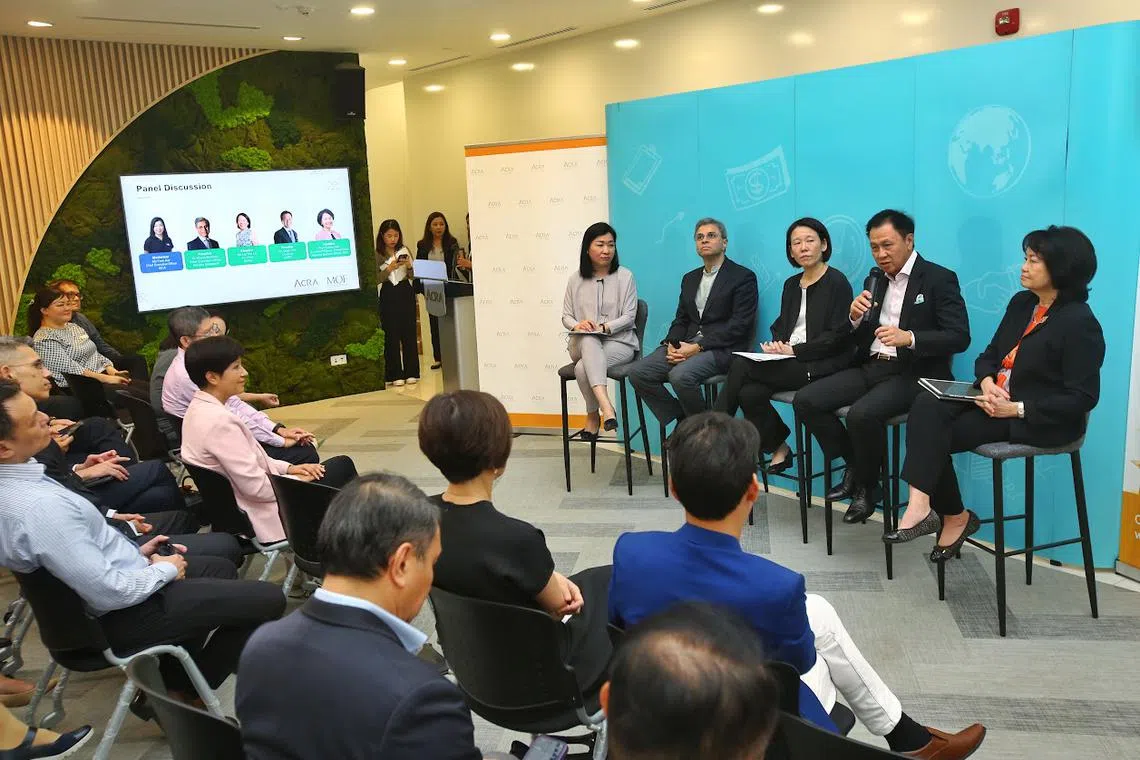Raise starting pay for accountants, set up more pathways into industry to draw more talent: Report
Sign up now: Get ST's newsletters delivered to your inbox

The proposals to attract more accounting talent were put forward in a report by the Accountancy Workforce Review Committee on May 10.
PHOTO: LIANHE ZAOBAO
SINGAPORE – Better starting pay is just one measure being suggested to lure more talent into the accounting sector amid declining interest in the profession among job seekers.
The proposal was put forward in a report by the Accountancy Workforce Review Committee that outlined several ways to make the industry more appealing to graduates and other mid-career professionals.
It comes as fewer students are interested in studying accountancy, while people who do not have a background in the field find it difficult to enter the profession, the report noted.
Ms Indranee Rajah, Minister in the Prime Minister’s Office, said at the report’s launch event on May 10 that young accountants feel that their starting pay lags behind that of their peers, even as they have to work long hours, especially during the peak season.
“At the end of the day, employees should feel appropriately compensated for the work they put in. Otherwise, the profession will not be able to attract enough young talent, despite good long-term salary and career prospects,” said Ms Indranee.
The 2023 Graduate Employment Survey noted that accountancy graduates from Singapore’s autonomous universities earned a median gross monthly starting salary of $3,800, which was lower than that of their peers from these universities ($4,313).
Accountancy graduates specifically in accounting jobs earned even less – $3,600. While accounting firms have undertaken pay revisions over the years, starting salaries remain a notch below those in other sectors.
Ms Indranee, who is also the Second Minister for Finance and National Development, noted at the launch at ISCA House in Cecil Street that some of the major accounting firms have committed to reviewing their starting salaries, without elaborating further.
Singapore’s accountancy sector is 120,000-strong, with about 20 per cent employed in accounting firms, which contribute $2.95 billion to the country’s gross domestic product.
The report also outlined a quicker route to gaining the national accountancy qualification, known as the Singapore Chartered Accountant Qualification (SCAQ).
Currently, polytechnic accountancy graduates must complete the foundation and professional programmes to earn the qualification, while autonomous university accountancy graduates are required only to do the professional programme. All SCAQ candidates must also fulfil three years of practical experience in an accredited training organisation.
Starting from 2024, polytechnic graduates who have completed the relevant subjects in their polytechnic programme will get an exemption for the Singapore taxation module in the foundation programme, in addition to the principles of financial reporting module from which they are already exempted.
With this exemption, an aspiring chartered accountant will have to take fewer foundation programme examinations and can become certified about six months earlier. The entire SCAQ journey previously took up to four to six years for polytechnic accountancy graduates.
Autonomous accountancy university graduates would take between two and three years after graduation to get the SCAQ qualification, assuming that they had completed part of the required practical experience through internships in university.
The Accounting and Corporate Regulatory Authority (Acra) recently gave greater weight to a graduate’s prior relevant work experience for the three years of practical experience requirement for the SCAQ. This extra consideration could shave up to six months off this requirement.
Also being considered is recognising the experience of candidates who may not be working in an accredited training organisation but whose work is of an accountancy-related nature.
The report’s other key recommendations include an initiative by Ngee Ann Polytechnic later in 2024 that will help non-accountancy graduates build a skills foundation by working in accounting firms for three to four months.
The committee that compiled the report comprised senior representatives from accounting firms, companies’ in-house finance functions, academia and the public sector. It was formed in 2022 under the Ministry of Finance and Acra.
It held discussions with over 300 participants, including employers, academics and regulators, as well as professionals like young accountants and mid-career switchers, and students.
KPMG audit manager Vinodini Ravi, 29, said accounting cannot be a safety-net career option for graduates. “It has to be an active choice that you make to join the industry,” said Ms Vinodini, who has been in the sector for seven years.
“The key satisfaction at my job is the challenges I face at work and how I get to resolve them. Auditing may be routine work, but my day-to-day tasks are not the same.”
Mr Chaly Mah, former chairman of the Singapore Accountancy Commission, noted: “The field of accountancy offers exciting opportunities in today’s dynamic business landscape, with roles in data analysis, risk management, sustainability reporting and digital transformation.
“The report provides a road map for addressing the challenges and opportunities in Singapore’s accountancy sector, ensuring a resilient pool of accountancy talent to meet industry needs.”


